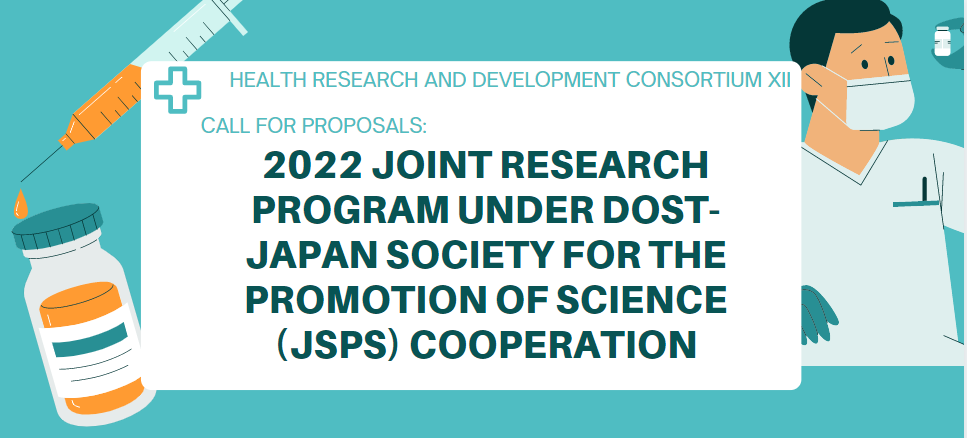This is to inform you that the Health Research and Development Consortium XII (HRDC XII) in coordination with the Department of Science and Technology (DOST) is pleased to announce the call for proposals for the 2022 Joint Research Program under the DOST – Japan Society for the Promotion of Science (JSPS) Cooperation.
The bilateral exchange program provides support for research to be conducted jointly by Filipino and Japanese researchers in line with their mutual agreement on international scientific collaboration.
Website: http://www.jsps.gov.jp/english / http://itcu.dost.gov.ph
The DOST - JSPS Joint Scientific Research Program is an inter-institutional cooperative arrangement initiated on 15 March 1979 through the signing of a Memorandum of Understanding (MOU) for Scientific Cooperation between the then National Science Development Board (now the Department of Science and Technology) and the Japan Society for the Promotion of Science (JSPS).
This bilateral program aims to establish sustainable collaborative relations for the advancement of the mutual benefits of the Philippines and Japan under the principle of reciprocity. It also aims to promote scientific researches and exchanges through an exchange of scientists, holding scientific seminars, and conduct of dissertation and degree researches under the joint guidance of Filipino and Japanese advisers. The Program is designed to create high potential research nuclei in the fields of natural sciences, social sciences, and humanities. The Program fosters and looks after the next generation of leading researchers in the country.
WHO MAY AVAIL OF THE SERVICE:
All Filipino researchers from universities and research institutions that plan to establish or that have already existing scientific collaborations with Japanese researchers by submitting research proposals for funding consideration. For Filipino researchers requiring DOST funding, the five priority areas include Health and Health Products, Alternative Energy, Biotechnology, Food and Agriculture, Environment, and Information Communication Technology.
If requirements are complete, the processing of application may take a year.
Note: Only one project will be selected yearly and project requiring DOST funding must not be more than Japanese counterpart.
HOW TO AVAIL OF THE SERVICE :
| Step | Proponent | Activity of the Office-in-Charge | Duration of Activity | Office-in-charge |
| 1 | Submits DOST-GIA Forms 1B, 2B, 2B-1, 2B-2, LIB to DOST JSPS Secretariat | Reviews the completeness of documents | 3 working days | DOST-JSPS Secretariat |
|
If documents are complete, prioritize projects for review by Sectoral Councils. If incomplete, informs the proponent. |
3 days per proposal | DOST-JSPS Secretariat | ||
| Exchanges list of submitted proposals to verify if the proposal was submitted by the counterpart proponents from each country
|
1 working day | DOST and JSPS | ||
|
Endorses the proposal (with the similar proposal submitted to JSPS by Japanese proponent) to the concerned Sectoral Council for review |
1 working day | DOST-JSPS Secretariat | ||
| Reviews and evaluates the proposal | 1 working day | DOST Sectoral Council | ||
| Determines which proposals to support/ selects proposal to be funded | DOST EXECOM | |||
| Exchanges priority list
|
4 to 5 months | DOST and JSPS | ||
| Final selection of project | 5 working days | DOST and JSPS | ||
|
Informs proponent of the selected proposal |
5 working days after project selection | DOST and JSPS |
Interested parties are requested to coordinate with prospective collaborators/counterparts in Japan to craft their proposals. The Filipino researcher must submit the proposal to DOST while the Japanese counterpart should submit the same to JSPS for separate review and evaluation. Only projects approved by both DOST and JSPS will be implemented under this program.
For the application guidelines and procedure, please refer to this link: https://tinyurl.com/DOSTJPN2022. The call for proposals will close on 08 September 2021, 5:00 PM.
For further inquiries, you may contact Ms. Jinah Ruth Jomao-as of the International Technology Cooperation Unit (ITCU) at This email address is being protected from spambots. You need JavaScript enabled to view it..
Thank you.






